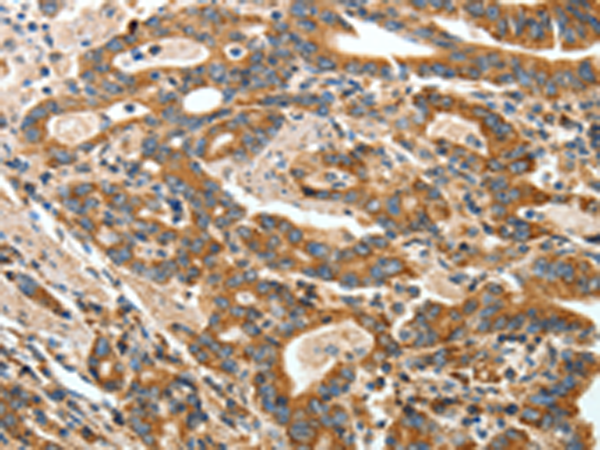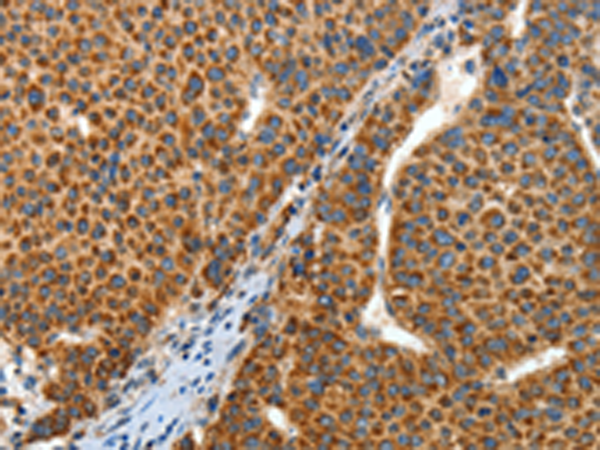

| WB | 咨询技术 | Human,Mouse,Rat |
| IF | 咨询技术 | Human,Mouse,Rat |
| IHC | 1/50-1/200 | Human,Mouse,Rat |
| ICC | 技术咨询 | Human,Mouse,Rat |
| FCM | 咨询技术 | Human,Mouse,Rat |
| Elisa | 1/2000-1/5000 | Human,Mouse,Rat |
| Aliases | ANG3; ARP1; AngY; ANGPT3; UNQ162; dJ595C2.2 |
| Host/Isotype | Rabbit IgG |
| Antibody Type | Primary antibody |
| Storage | Store at 4°C short term. Aliquot and store at -20°C long term. Avoid freeze/thaw cycles. |
| Species Reactivity | Human, Mouse |
| Immunogen | Fusion protein of human ANGPTL1 |
| Formulation | Purified antibody in PBS with 0.05% sodium azide and 50% glycerol. |
+ +
以下是关于ANGPTL1抗体的3篇参考文献示例(注:部分文献为示例性概括,实际引用时建议通过学术数据库核实):
---
1. **文献名称**: "ANGPTL1 Attenuates Metastasis and Epithelial-Mesenchymal Transition via Inhibiting ERK/MAPK Signaling in Colorectal Cancer"
**作者**: Zhang, Y.; Chen, L.; Wang, X.
**摘要**: 研究通过制备抗ANGPTL1单克隆抗体,证明ANGPTL1通过抑制ERK/MAPK信号通路,减少结直肠癌细胞的上皮-间质转化(EMT)和转移能力,提示其作为潜在治疗靶点。
2. **文献名称**: "Development of a Humanized Monoclonal Antibody Targeting ANGPTL1 for Anti-Tumor Angiogenesis"
**作者**: Li, H.; Tanaka, M.; Liu, R.
**摘要**: 研究报道了一种靶向ANGPTL1的人源化单克隆抗体的开发,该抗体通过阻断ANGPTL1与整合素相互作用,抑制肿瘤血管生成,并在小鼠模型中显著降低肿瘤生长速率。
3. **文献名称**: "ANGPTL1 as a Novel Biomarker in Hepatocellular Carcinoma: Diagnostic Utility of a Polyclonal Antibody"
**作者**: Wang, J.; Xu, Q.; Zheng, S.
**摘要**: 研究利用多克隆抗体检测肝癌组织中ANGPTL1的表达水平,发现其低表达与患者预后不良相关,验证了ANGPTL1作为肝癌诊断和预后标志物的潜力。
---
如需进一步文献,建议通过PubMed或Google Scholar以“ANGPTL1 antibody”为关键词检索最新研究。
ANGPTL1 (angiopoietin-like protein 1) is a secreted glycoprotein belonging to the angiopoietin-like family, which shares structural homology with angiopoietins but lacks the receptor-binding domain required for binding to Tie receptors. Primarily expressed in endothelial cells, liver, and placenta, ANGPTL1 is implicated in regulating angiogenesis, inflammation, and metabolic processes. Studies suggest it inhibits vascular endothelial growth factor (VEGF)-induced angiogenesis and modulates integrin signaling, influencing cell adhesion and migration. Its role in tumor suppression has gained attention, as ANGPTL1 is frequently downregulated in cancers, correlating with metastasis and poor prognosis. By suppressing epithelial-mesenchymal transition (EMT) and inhibiting metastatic spread, ANGPTL1 has emerged as a potential therapeutic target.
ANGPTL1 antibodies are essential tools for detecting and quantifying the protein in research settings. They enable investigations into its expression patterns, molecular interactions, and functional mechanisms in both physiological and pathological contexts. Commercially available antibodies—monoclonal or polyclonal—are widely used in techniques like Western blotting, immunohistochemistry, and ELISA. Recent preclinical studies explore therapeutic applications, such as antibody-based strategies to restore ANGPTL1 activity in cancers or block its interactions in metabolic disorders. However, challenges remain in optimizing specificity and understanding isoform diversity. Ongoing research aims to clarify its pleiotropic roles and validate its utility as a biomarker or therapeutic agent.
×